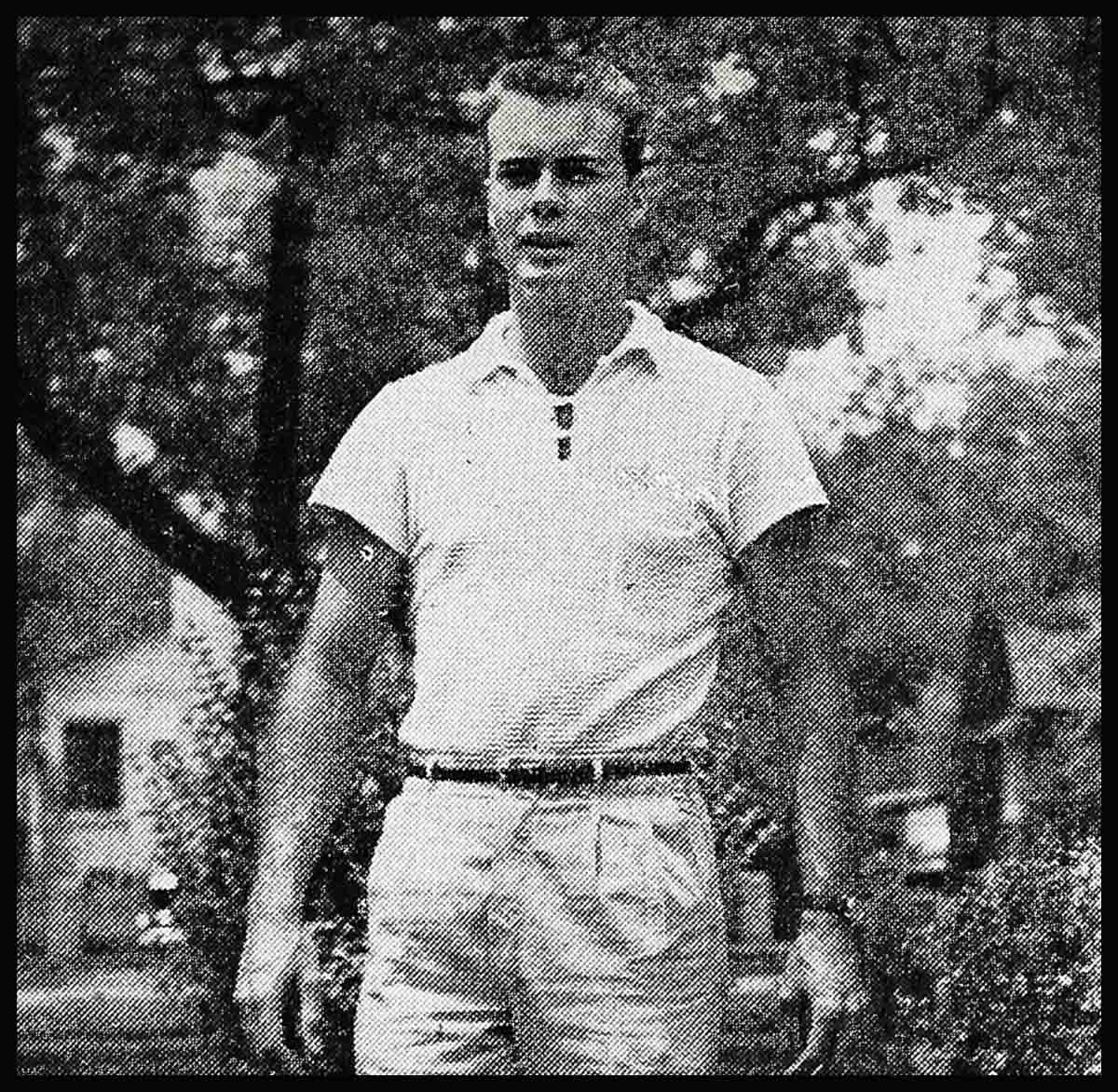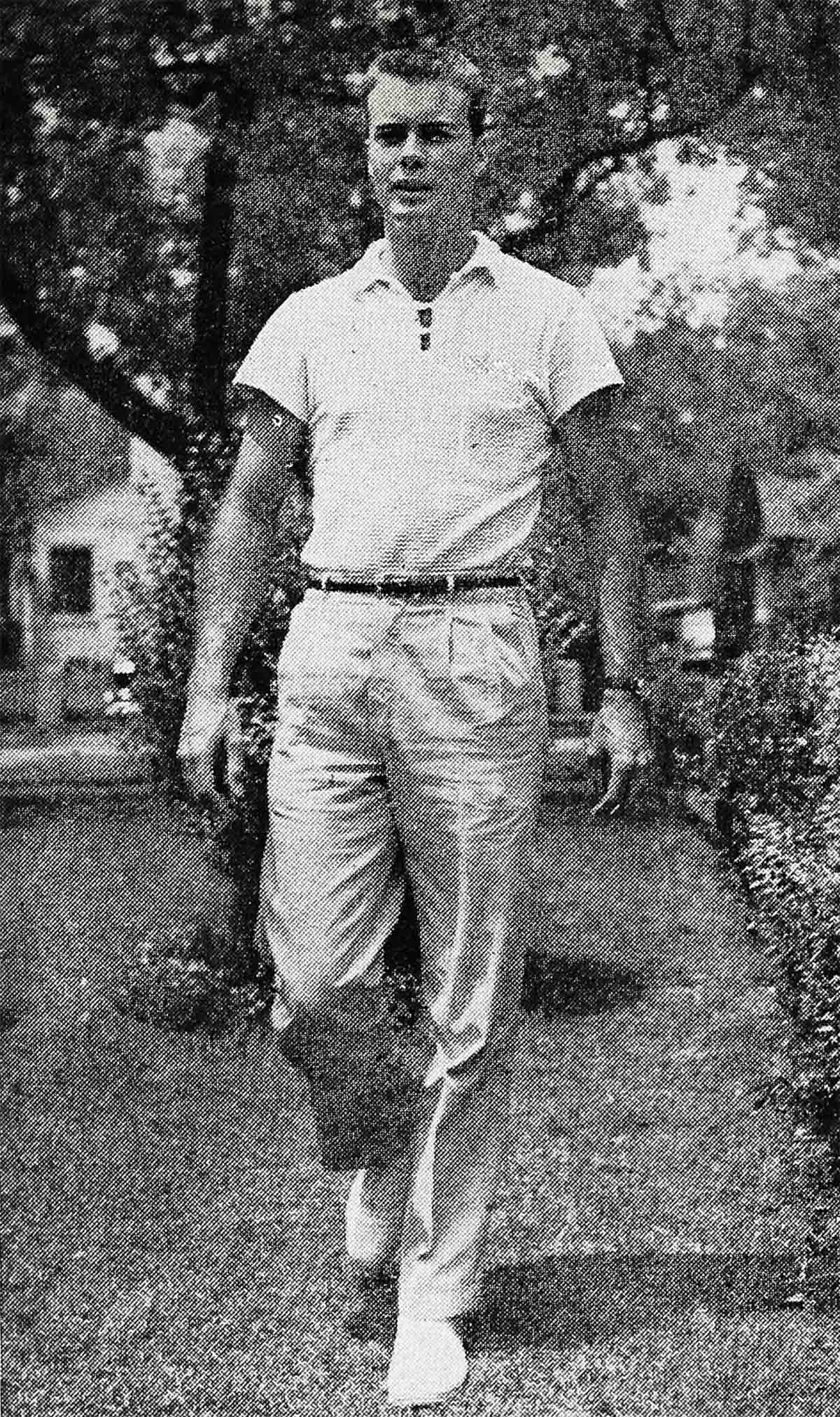
Full Speed Ahead—Robert Francis
“Who could play Queeg?” the young Army corporal wondered. “Spencer Tracy, maybe?” His friends, the three captains who’d lent him a well-read copy of “The Caine Mutiny,” each had a different suggestion. But on one point they all agreed: Willie Keith had them stumped. “Nope,” the corporal said, “I can’t think of anybody who’d be right for Willie.”
This was in 1952, and all over the country thousands of readers were making a game of casting the movie version of the top best-seller. But the discussion between the four Army friends was unique in one way: The young corporal was Robert Francis, who made his movie debut two years later as Willie Keith.
How did this minor miracle happen? First, let’s look at Bob as he is now.
A truly refreshing screen personality, Bob has captured the hearts of moviegoers in record time. With his strong, pleasantly bony features and his crewcut, dark-blond hair, he hasn’t the currently fashionable brand of good looks. More important, nothing in his appearance or his manner suggests the atmosphere of movie sets or night clubs. You’d imagine him instead at home in the outdoors—and your imagination would be right.
Though Bob has now made three more movies in rapid succession, he hasn’t really been absorbed into the life of Hollywood. He lives with his parents in Pasadena and spends most of his spare time there. His favorite date is a girl who has no connection with the movie business. And, as the memory of glorious ski flights among the high snows shines in his blue eyes, he can say with an earnestness that must be believed, “Some day I’m going back to the mountains and hibernate!”
Like many of the new generation of stars, he’s a native Californian; he was born in Glendale on February 26, 1930. Unlike most of his rivals, Robert Charles Francis had no acting ambitions as a youngster; at Wilson Junior High and Pasadena City College, he took no part in amateur theatricals. His heart was committed to another love.
He’d acquired his fondness for the outdoors as a Boy Scout and on weekend trips into the mountains with his dad and his older brother. During one of these trips, Bob strapped on a pair of skis for the first time. It seemed like just another sport while he was a stumbling beginner. But soon the exhilaration of gliding downhill, the mountain air brusquely caressing his cheeks, convinced him that he’d found his chief interest in life. Bob Francis, aged eleven, solemnly resolved that he was going to be not only an expert skier, but a champion, representing his country at the Olympic Games.
That was his abiding passion all during his teens. A boy’s usual concerns—girls, school activities—were brushed aside while Bob dedicated himself to skiing. He ranged up and down the West Coast, competing in one race after another, acquiring a taste for travel that he still has. And he wasn’t discouraged by the dangers of the sport. During a race, he was making a fast turn when he fell with such force that his ski pole stabbed through his right forearm. He still has the scar: as a souvenir.

Bob was determined to remain an amateur, so he had to plan some means of earning a living. But he didn’t stray far from his chosen field; he and his brother Bill decided to open a ski-equipment shop. Looking far ahead, Bob speeded up his education, taking summer courses for four or five years. By the time he was sixteen, he’d completed two years of college. “I just wanted to get college out of the way to satisfy my parents,” he explains. And at seventeen, Bob was a businessman. The Francis brothers operated three ski shops at Big Pines and Mt. Waterman. They hadn’t set themselves an easy task, because they were a little ahead of the game. Now the biggest skiing area in the country, this section wasn’t so popular at the time. But the brothers kept slugging away.
Bob Francis had his life all figured out. So he thought. Only a little matter of climate turned his plans upside down. His was a seasonal sport, of course. When the snows melted, he went on enforced vacations from skiing and running the shops. One summer day when Bob was nineteen, he was enjoying lazy hours on the beach at Santa Monica. Thanks to his rigorous athletic training, his body was nearing the hard-muscled six feet three inches, 194 pounds that it scales today. Plenty of warmly appreciative feminine eyes turned his way. So did a pair of coolly appraising masculine eyes. These belonged to a U-I talent scout, who sized Bob up as a promising bit of movie merchandise.
Bob hadn’t the slightest idea that he was being watched. Just as the scout was about to approach him, Bob decided he’d done enough swimming and sunning. He jumped into his car and drove off, happily unaware that the scout was busy noting down the license.
Then the scout turned detective and found out the name that went with the number. Presently, the phone rang at the Francis home, and Bob heard an astonishing suggestion: Would he come to U-I for an interview? Surprised he may have been, but he wasn’t particularly impressed. He’d devoted so little thought to the movie business that, he admits, “I didn’t even know what U-I was.” Once this point was cleared up, Bob figured: What have I got to lose? He and his brother had finally given up their ski-shop venture, and he was at loose ends.
In a skeptical frame of mind, Bob went to keep his appointment at U-I. “They’ll never get me,” he assured his family. But his interview with Sophie Rosenstein, U-I’s late, beloved dramatic coach, changed his mind. Miss Rosenstein asked him to do a reading with a newcomer named Ann Pearce. Inexperienced as Bob was, his appearance, his voice and his personality looked like star-stuff, and Miss Rosenstein advised him to take dramatic lessons.
She sold him on the idea, but he remained faithful to his first love. “I’ll become a big movie star,” he decided innocently, “and make half a million dollars, and then I’ll go back into the ski-shop business.” Once again he was forced to change his mind in a hurry. He’d been referred to drama coach Batomi Schneider. One session with her, one earful of her frank criticism—and, says Bob, “I realized I couldn’t make five cents as a movie actor!”

All his sporting blood was up. Learning to act was a challenge, an exciting new game—at first. As the months went by, he took it more and more seriously. Mrs. Schneider wouldn’t let him even try out for a role until he’d put in a year of hard study. (That explains why, with no real professional experience, Bob could hold his own with all the wise old pros in “The Caine Mutiny.”) When his year was up, he was offered a contract at Columbia. But his big moment hadn’t yet arrived.
Before the studio could sign him, Uncle Sam stepped in with a prior claim, inviting Bob to spend a couple of years in the Army. This institution never got around to satisfying Bob’s yearning for travel; he wasn’t sent any farther from home than Camp Roberts, California, where the Army made use of his training to instruct fellow soldiers in public speaking. And there he shared an office with the three captains who loaned him a copy of “The Caine Mutiny.”
Quite unconscious of the fact that he was destined to be the screen’s Willie, Bob followed the example of the novel’s young ensign: He found a lasting romance while he was in the service. On a weekend leave in Pasadena, he and another boy were headed for a friend’s home when his pal said. “There’s a lovely girl in the car ahead. Let’s ask her to the party.” An obliging traffic light stopped both cars. The boys shouted their invitation and got a smiling refusal. Bemused by the pretty blonde, they hardly noticed that she made a turn when the light changed. Their car hit hers broadside, but both were going so slowly that little damage was done.
When all three climbed out for the routine post mortem, Bob discovered that the girl was a former schoolmate of his. Dorothy Ross (four feet eleven, eighty-five pounds, “the kind you’d like to put in your pocket,” Bob says) is still his “little girl-friend.” Hollywood’s most glamorous actresses are all around him, but he hasn’t forgotten the pocket-sized charmer who works in the personnel department at a jet-plane plant.
His years in uniform completed, Bob took off for a two-week vacation in Las Vegas. Then he planned a month in Hawaii. Just in time, he got a phone call that eventually took him to Hawaii on business, with all expenses paid. Columbia Pictures told him there might be “a small bit part” for him in one of their upcoming movies. They sent him the script of “The Caine Mutiny,” without revealing which role he was being considered for. A short session with Boss Harry Cohn, a long one with producer Stanley Kramer, a screen test with Donna Reed standing in for May Wynn—and Bob became Willie Keith. Three days later, he was off to Yosemite for the picture’s love scenes, shot before the location trip to Hawaii. Here was the turning point in Bob’s life.
The three captains who’d been his Army friends sent him a long congratulatory letter, pretending to appoint themselves his agents, at the usual ten percent of his salary. When “The Caine Mutiny” started shooting, Van Johnson made a big gag out of “hating” Bob, because the youngster had stolen the part that Van wanted for himself. (Johnson, of course, wound up with only the best role in the picture.) And Dorothy Ross gave her beau a gift he treasures sentimentally: a pair of silver cufflinks, on which anchors and tiny silver spheres symbolize the Navy and the steel balls associated with Captain Queeg of the Caine. As for Bob’s fellow cast members, they ceremoniously handed him a couple of B-B shots—“for the junior Queeg.”
Three more movies (“They Rode West,” “I Was a Prisoner in Korea” and “The Long Gray Line”) convinced Bob that his movie career was no flash in the pan. He’s come to regard it as earnestly as he does his life in general. Bob himself thinks he has this attitude because he’s always associated so much with older people. Eleven years separate him from his older brother and sister. (“I was an afterthought,” he says.) Beginning to ski in his early teens, he was usually much the junior of the other enthusiasts. He counts Fred MacMurray and Tyrone Power among the closest friends he’s made so far in Hollywood.
With engaging unawareness of his own appeal, Bob muses, “Ty must be terrifically attractive to women—so much poise—and now a continental manner, after all his traveling. Dorothy and I went out with the Powers one evening, and I almost lost my girl! I tried giving Linda the eye, but I couldn’t get her to look at me, either.”
But with the assured success of The Caine Mutiny—and three other pictures coming up—Bob Francis has every hope of being one of the busiest and most popular young stars in the 1954 sky. And any old horoscope reader might find things looking very good for 1960! Wanna bet!
THE END
—BY EVE FORD
It is a quote. PHOTOPLAY MAGAZINE SEPTEMBER 1954




